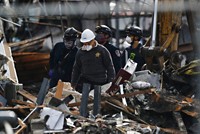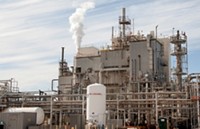Advertisement
Grab your lab coat. Let's get started
Welcome!
Welcome!
Create an account below to get 6 C&EN articles per month, receive newsletters and more - all free.
It seems this is your first time logging in online. Please enter the following information to continue.
As an ACS member you automatically get access to this site. All we need is few more details to create your reading experience.
Not you? Sign in with a different account.
Not you? Sign in with a different account.
ERROR 1
ERROR 1
ERROR 2
ERROR 2
ERROR 2
ERROR 2
ERROR 2
Password and Confirm password must match.
If you have an ACS member number, please enter it here so we can link this account to your membership. (optional)
ERROR 2
ACS values your privacy. By submitting your information, you are gaining access to C&EN and subscribing to our weekly newsletter. We use the information you provide to make your reading experience better, and we will never sell your data to third party members.
Industrial Safety
Dust accidents, worker participation in investigations top U.S. Chemical Safety Board agenda
Board clarifies, publicizes previously confidential policy
by Jeff Johnson, special to C&EN
October 25, 2018
| A version of this story appeared in
Volume 96, Issue 43

Curbing a seemingly endless string of combustible dust accidents and clarifying the role company employees can play in chemical accident investigations topped the U.S. Chemical Safety & Hazard Investigation Board agenda at its Oct. 24 business meeting.
On dust, CSB announced a “call to action” to gather more information from companies, unions, regulators, workers, and others on safe management and control of combustible dust. CSB investigator Cheryl MacKenzie noted that since 1980, 386 dust-related accidents have occurred in a variety of U.S. industries, including chemical manufacturers and metal and plastic fabrication industries. Those incidents killed 178 workers and injured more than 1,000 others.
After several investigations, CSB has recommended four times that the Occupational Safety & Health Administration regulate industrial dust, which OSHA has the authority to do. However, OSHA has not proposed dust regulations. CSB does not have regulatory powers.
CSB’s call for information ends Nov. 26. The board hopes it will result in effective, nonregulatory solutions to control dust and eliminate accidents.
On participation of company employees in CSB investigations, the board adopted a new policy clarifying the role of workers in CSB accident investigations. The vote, however, split the board: Interim Executive Authority Kristen Kulinowski and board member Rick Engler supported the policy, while board member Manuel (Manny) Ehrlich abstained.
Engler, who introduced the new policy, said employee participation was a “pillar” of CSB accident investigations. However, CSB’s previous policy on employee participation was confidential and used only by CSB staff. The policy clarifies and updates participants’ roles, and it will be publicly available.
Ehrlich’s chief objection to the policy was that it was too lengthy and unneeded. In particular, he wanted to eliminate a provision describing how CSB investigators should address company management interference with employee participation in investigations.
The provision calls for CSB to report interference or obstruction with investigations to federal law enforcement. Ehrlich said the provision would be punitive and proscriptive and in the end would tie the hands of CSB staff doing the investigation. He proposed having CSB’s head of investigations, Stephen Klejst, rework the provision.
Engler countered that the new policy was drawn up by a team of CSB investigators and managers and mirrors policies in other government agencies. “Going back was not a great use of time or resources,” he added. “We have bigger challenges.”
Other sections of the policy address whistle-blower protection, working with multiple labor unions, protection of companies’ confidential business information, and employee participation in site walk-throughs and on-scene investigations.




Join the conversation
Contact the reporter
Submit a Letter to the Editor for publication
Engage with us on Twitter